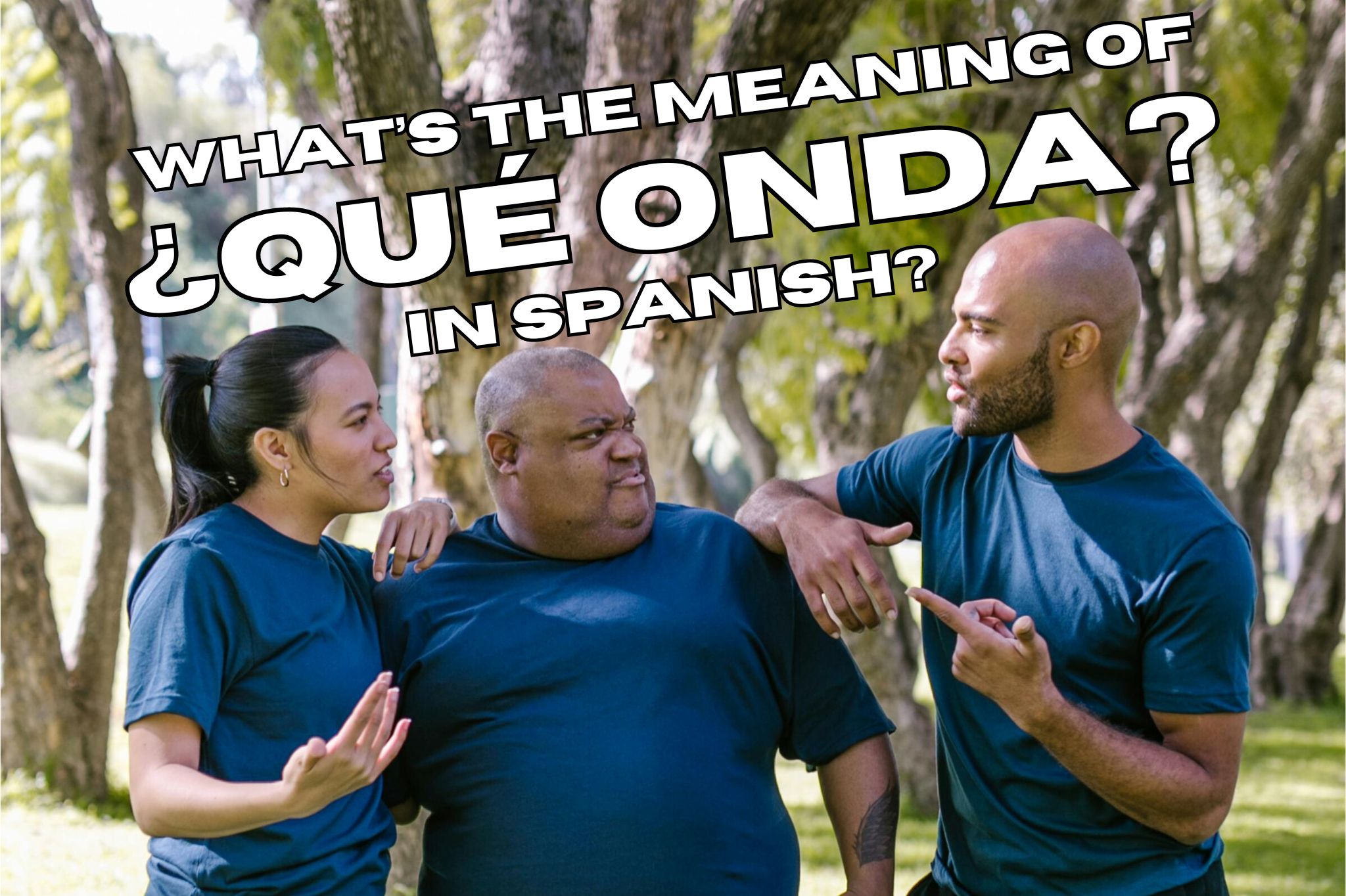¿Qué Onda? Understanding this common Spanish greeting

Get our free email course, Shortcut to Conversational.
Have conversations faster, understand people when they speak fast, and other tested tips to learn faster.
More infoHave you ever heard someone say ¿qué onda? in Spanish and wondered what it meant? This popular phrase is more than just a greeting, it’s a window into casual Spanish conversation.
Equivalent to what’s up? in English, ¿qué onda? is used in various contexts, from greeting friends to expressing surprise or concern. Whether you’re learning Spanish or just want a quick way to interact with your friends, understanding this versatile phrase can help you connect more naturally with Spanish speakers.
Now let’s dive into our qué onda meaning, usage, and origins!
Qué onda: Meaning
So, what does qué onda mean? Let’s first break it down literally, and then get into our contemporary qué onda meaning and history.
The first word is qué, which is one of our most common question words. Qué is usually translated as what, and can sometimes be translated as which or how.
The Spanish word onda means wave in English, usually referring to smaller ripples but also used for bigger waves.
In our expression here, onda is used metaphorically to signify the vibe or the feeling of a situation. With this in mind, asking ¿qué onda? is akin to inquiring about the current mood or state of affairs. A literal qué onda translation could therefore be more along the lines of what’s the vibe? in English.
The precise origin of qué onda is somewhat unclear, as it’s a colloquial phrase that has evolved over time. One widely accepted theory connects the phrase to the Onda literary movement in Mexico, which began in the 1960s. Writers from this movement aimed to capture the language of youth and popular culture, incorporating colloquial expressions and innovative terms. In this context, the word onda gained popularity, coming to signify the attitude, fashion, and trends of the era.
What is certain is that qué onda originated as a Mexican slang expression, and has since been adopted in many other Spanish-speaking regions. There may be slight variations in usage from one place to the next, but the core meaning remains the same.
Qué onda: Usage
The expression ¿qué onda? can be used in multiple contexts, so let’s see each of them here.
Keep in mind that the qué always has an accent mark, so you should never write it as “que onda.” Note that some native speakers sometimes write it mistakenly as “qué honda” or “que honda,” since the Spanish h is silent. Be sure to always spell it correctly as qué onda! Only in Spanish text message language is it ok to abbreviate it as q onda.
Now, let’s see the uses of qué onda in Spanish!
Greeting
When you meet up with friends, ¿qué onda? is a friendly and informal way to say hello and check in on how they are doing. It’s just like saying what’s up? in English, and sets a relaxed tone for the conversation.
- ¡Hola, Pablo! ¿Qué onda? – Hey, Pablo! What’s up?
- ¿Qué onda, amiga? Tiempo sin verte. – What’s up, girl? Long time no see.
Showing concern
When you’re worried about someone or notice something unusual, ¿qué onda? is a thoughtful way to ask about their well-being. It’s a way to show that you care and are interested in understanding what’s going on with them.
- ¿Qué onda contigo? ¿Te sientes mal? – What’s up with you? Do you feel unwell?
- ¿Qué onda, Daniela? ¿Por qué lloras? – What’s up, Daniela? Why are you crying?
Expressing surprise
If you encounter something unexpected or out of the ordinary, ¿qué onda? is a great way to express your surprise or confusion.
- ¿Conseguiste entradas para el concierto? ¡¿Qué onda?! – You got tickets for the concert? Woah?!
- ¡Qué onda con esa noticia! – What the hell is up with that news!
Assessing a situation
You can use ¿qué onda? to ask for details about an event or situation.
- ¿Qué onda con la fiesta? – What’s happening with the party?
- ¿Sabes qué onda con Luisa? Desde ayer no la veo. – Do you know what’s going on with Luisa? I haven’t seen her since yesterday.
Making an accusation
In a situation where you suspect something is wrong or someone’s behavior is questionable, ¿qué onda? can convey your suspicion or accusation. It’s a way of questioning someone’s actions.
- ¿Qué onda con tus comentarios? Si no tienes nada bueno que decir, mejor no digas nada. – What’s up with your comments? If you don’t have anything good to say, it’s best that you say nothing.
- No entiendo qué onda con tu actitud. Mejor nos vemos mañana. – I don’t understand what’s up with your attitude. I’ll see you tomorrow.
Alternatives to Qué onda
In addition to qué onda, a couple of other expressions can be used in similar circumstances. The first one we’ll see here, qué pasa, is quite common throughout the Spanish-speaking world, while the second one, qué hubo, is a good option if you’re in Colombia.
¿Qué pasa?
¿Qué pasa? is also an informal expression used to say what’s up? in Spanish. It’s built on the Spanish verb pasar, whose meaning in this expression is to happen.
¿Qué hubo?
¿Qué hubo? originated as a common Colombian slang expression whose literal meaning is something like what happened? or what was it? It’s built on the third-person singular preterite conjugation of the verb haber, used in this context as an impersonal verb. The present tense of this use is hay, which means there is or there are in Spanish, so qué hubo is a way of asking what there was. This slang expression has been around long enough that it even has its own phonetic spelling as ¿quiubo?
Other Spanish greetings
We have another beginner post with a handful of greetings and goodbyes in Spanish, including a whole series of regional slang for what’s up? For some of the most important ones, including ¿qué onda?, ¿qué pasa?, and ¿quiubo?, Mafalda introduces ten great alternatives to ¡hola! in this video.
Conclusion: Qué onda in Spanish
In today’s post we explored the versatile Spanish phrase ¿qué onda?, considering its origins and its various uses in everyday conversation.
Originally used in Mexican slang, this phrase has become fairly common as an informal expression to greet friends, express surprise, show concern, assess situations, and even make accusations. We can usually go with what’s up? when we want to translate ¿qué onda? in English, though certain contexts call for slightly different qué onda meanings.
So ¿qué onda, amigos? Are you comfortable with this common expression by now? Give it a try next time you’re in an informal setting with Spanish speakers, and see how they react when you greet them with a friendly ¿qué onda?!



